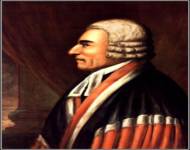Early Life
William Cushing was born in Scituate, Massachusetts, on March 1, 1732. His father and grandfather were both superior court judges. Cushing graduated from Harvard College in 1751 and was admitted to practice law in 1755.
Legal Career
Cushing worked in a private practice in his hometown for five years before moving to Lincoln County, Massachusetts (present day Maine) in 1760. He practiced law for the next twelve years before being appointed to fill his father’s recently vacated seat on the Superior Court of Massachusetts in 1772.
Cushing would go on to become the court’s Chief Justice in 1777, a position he held until 1789. During his time as Massachusetts Chief Justice, Cushing played a major role in the 1783 court ruling that ended slavery in Massachusetts.
Supreme Court
After the Revolutionary War, President Washington nominated William Cushing to become the first associate justice of the United States Supreme Court. Cushing’s term began on September 26, 1789.
Cushing served as a Justice until his death in 1810, becoming President Washington’s longest serving Supreme Court appointment. In 1796 President Washington nominated Cushing to be Chief Justice, but he declined.
During his time on the Supreme Court, Justice Cushing’s views generally tended towards the views of the Federalist Party. However, because of his frequent travels and health problems, Cushing is only credited with nineteen decisions during his time on the Supreme Court.
Cushing’s two most important decisions came in Chisholm v. Georgia (1793) and Ware v. Hylton (1796). In Chisholm v. Georgia, Cushing voted to allow citizens the right to sue the federal court of another state, a nationalist view in line with the Federalist Party. However, the Eleventh Amendment in 1795 almost immediately dismissed this ruling. In Ware v. Hylton, the court ruled that state laws violating international treaties are unconstitutional. Justice Cushing again held a nationalist opinion.
Death
On September 13, 1810, Cushing died in his hometown of Scituate, Massachusetts, at the age of seventy-eight.








